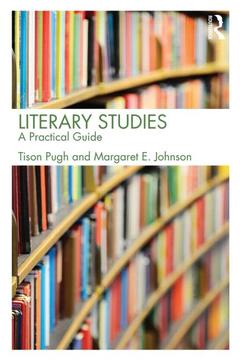Literary Studies A Practical Guide
Auteurs : Pugh Tison, Johnson Margaret E.

Literary Studies: A Practical Guide provides a comprehensive foundation for the study of English, American, and world literatures, giving students the critical skills they need to best develop and apply their knowledge. Designed for use in a range of literature courses, it begins by outlining the history of literary movements, enabling students to contextualize a given work within its cultural and historical moment. Specific focus is then given to the use of literary theory and the analysis of:
- Poetry
- Prose fiction and novels
- Plays
- Films.
A detailed unit provides clear and concise introductions to literary criticism and theory, encouraging students to nurture their unique insights into a range of texts with these critical tools. Finally, students are guided through the process of generating ideas for essays, considering the role of secondary criticism in their writing, and formulating literary arguments. This practical volume is an invaluable resource for students, providing them with the tools to succeed in any English course.
Introduction Part 1: An Introduction to the English Language, Its Literatures, and Its Readers 1. A Brief Linguistic History of England 2. A Brief History of English Literature 3. A Brief History of American Literature 4. A Brief History of World Literature 5. A Brief History of Literary Criticism Part 2: How to Analyze Poetry 1.Accent and meter 2. Poetic Terms and Figurative Language 3. Poetic Genres Part 3: How to Analyze PlaysPart 4: How to Analyze Prose Fiction and Novels Part 5: How to Use Literary Theory 1.Close Reading 2. Semiotics 3. Rhetorical Analysis 4. Genre and Genre Theory 5. Marxist Approaches 6. Ideology 7. Psychoanalysis 8. Gender and Feminist Theory 9. Queer Theory Part 6: How to Analyze FilmsPart 7: How to Write about Literature and Film: A Practical Guide 1. How and Why to Write an Essay
Tison Pugh is Professor in the Department of English at the University of Central Florida, USA.
Margaret E. Johnson is Professor of English at Idaho State University, USA.
Date de parution : 12-2013
15.6x23.4 cm
Date de parution : 12-2013
15.6x23.4 cm
Disponible chez l'éditeur (délai d'approvisionnement : 14 jours).
Prix indicatif 160,25 €
Ajouter au panierThèmes de Literary Studies :
Mots-clés :
Routledge; Literature; English; Introduction; Literary Studies; Tison Pugh; Margaret Johnson; Genre; Poetry; Plays; Prose; Novels; Literary Theory; Film; Essay-writing; American Literature; World Literature; Young Man; Practical; Sir Gawain; Romantic Comedies; Common Language; School For Scandal; Men In Black; Fyodor Dostoyevsky; Early Modern English; Parenthetical Citations; Littleneck Clams; Madame Pernelle; Great Vowel Shift; Scottish Gaelic; Iambic Pentameter; Cinematic Adaptations; Naked Civil Servant; Sir Patrick Spens; Essay’s Thesis; Critical Race Theories; Middle English; Silex; Gangster Film; Wild Man; Nineteenth Century Russian Literature; Robin Hood
